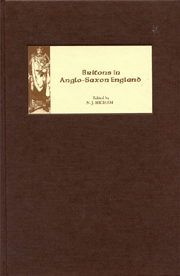Book contents
- Frontmatter
- Contents
- List of Illustrations
- List of Tables
- Contributors
- Dedication
- Acknowledgements
- Abbreviations
- 1 Britons in Anglo-Saxon England: An Introduction
- 2 Anglo-Saxon Attitudes
- 3 Forgetting the Britons in Victorian Anglo-Saxon Archaeology
- 4 Romano-British Metalworking and the Anglo-Saxons
- 5 Invisible Britons, Gallo-Romans and Russians: Perspectives on Culture Change
- 6 Historical Narrative as Cultural Politics: Rome, ‘British-ness’ and ‘English-ness’
- 7 British Wives and Slaves? Possible Romano-British Techniques in ‘Women's Work’
- 8 Early Mercia and the Britons
- 9 Britons in Early Wessex: The Evidence of the Law Code of Ine
- 10 Apartheid and Economics in Anglo-Saxon England
- 11 Welsh Territories and Welsh Identities in Late Anglo-Saxon England
- 12 Some Welshmen in Domesday Book and Beyond: Aspects of Anglo-Welsh Relations in the Eleventh Century
- 13 What Britons Spoke around 400 AD
- 14 Invisible Britons: The View from Linguistics
- 15 Why Don't the English Speak Welsh?
- 16 Place-Names and the Saxon Conquest of Devon and Cornwall
- 17 Mapping Early Medieval Language Change in South-West England
- Index
15 - Why Don't the English Speak Welsh?
Published online by Cambridge University Press: 12 September 2012
- Frontmatter
- Contents
- List of Illustrations
- List of Tables
- Contributors
- Dedication
- Acknowledgements
- Abbreviations
- 1 Britons in Anglo-Saxon England: An Introduction
- 2 Anglo-Saxon Attitudes
- 3 Forgetting the Britons in Victorian Anglo-Saxon Archaeology
- 4 Romano-British Metalworking and the Anglo-Saxons
- 5 Invisible Britons, Gallo-Romans and Russians: Perspectives on Culture Change
- 6 Historical Narrative as Cultural Politics: Rome, ‘British-ness’ and ‘English-ness’
- 7 British Wives and Slaves? Possible Romano-British Techniques in ‘Women's Work’
- 8 Early Mercia and the Britons
- 9 Britons in Early Wessex: The Evidence of the Law Code of Ine
- 10 Apartheid and Economics in Anglo-Saxon England
- 11 Welsh Territories and Welsh Identities in Late Anglo-Saxon England
- 12 Some Welshmen in Domesday Book and Beyond: Aspects of Anglo-Welsh Relations in the Eleventh Century
- 13 What Britons Spoke around 400 AD
- 14 Invisible Britons: The View from Linguistics
- 15 Why Don't the English Speak Welsh?
- 16 Place-Names and the Saxon Conquest of Devon and Cornwall
- 17 Mapping Early Medieval Language Change in South-West England
- Index
Summary
Introduction
ALONG with many eminent British linguists, such as Robert W. Burchfield or David Crystal, Richard Coates, in a recent study on the Late British contribution to the making of English toponymy, commented on the absence of ordinary lexis of Late British origin in the English lexicon by saying that:
We shall need to confront the apparent paradox that whilst the Angles and the Saxons seem content to have taken some place-names from the Britons – not an enormous number, but not negligible either – they took practically no ordinary vocabulary.
Is this really a paradox? I would claim that comparison with other instances of historical shift situations should lead us to expect that English did not borrow much lexical material from Late British. I would also suggest that while English did not borrow much lexis, the language was indeed affected by grammatical and phonological transfer from Late British before the impact of the Vikings and the Normans made itself felt, but that this only showed in writing in the Early Middle English period after the demise of Old English diglossia. It was the lack of earlier scholarly attention given to the different types of linguistic contact situations as well as to the complex processes of language acquisition, change, death and birth, which prompted the question: ‘Why did the Britons not contribute more loan words to English?’ In the following paper, I am going to discuss a few recent linguistic approaches and explore what they may tell us about the type of linguistic situation which obtained in Britain during the period of the Anglo-Saxon takeover and before the advent of the Vikings.
- Type
- Chapter
- Information
- Britons in Anglo-Saxon England , pp. 192 - 214Publisher: Boydell & BrewerPrint publication year: 2007



